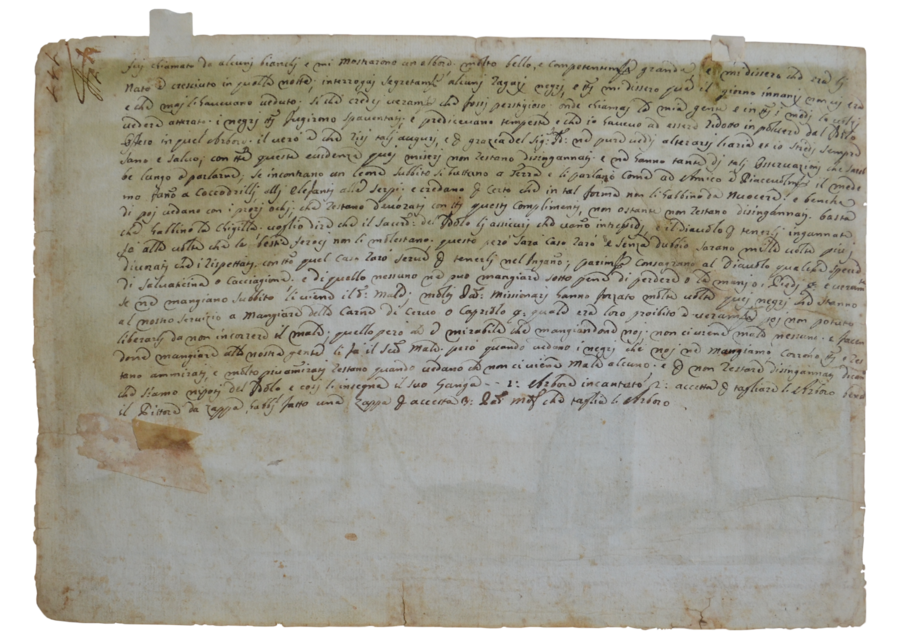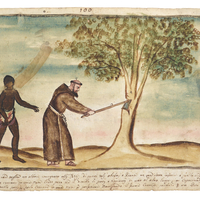PW100: Missionary Father who cuts a tree consecrated to the Idols
Pade missionario che taglia un albore consagrato alli Idoli; di questi tali Arbori e Pianti ve ne sono infinite e quello che e mirabile le piantano e crescano in una notte; credo pero che il diavolo li porti e trapianti da unoal altro luogo; non capacitandomi come naturalmene il diavolo possi farlo crescere in una notte a perfettione. Navigando il fiume Coanza passando p[er] un Orto di Zuche fagioli et cetera
[verso] fui chiamato da alcuni bianchi e mi mostrarono un albero molto bello e compotenteme grande e mi dissero che era li nato e cresciuto in quella notte; interrogai segretamente alcuni ragazi negri, e tutti me dissero que il giorno innani no vi era e che mai l’havevano veduto; si che credi verame che fossi perstigioso; onde chiamai la mia gente e in t[u]tti i modi lo volzi vedere atterato; i negri t[u]tti fugirono spaventati; e predicevano tempeste e che io havevo ad essere ridoto in polvere dal Idolo Offeso in quel Arbore. il vero e che risi tal auguri, e per grazia del Sig:e Id:o ne pure veddi alterarsi l’aria et io stiedi sempre sano e salvo; con t[u]tte queste evidenze quei miseri non restano disingannati e ne hanno tante di tali Osservazioni che sarebbe lungo a parlarne; se incontrano un leone subbito si buttano a Terra e li parlano come ad Amico e Piacevolemeil medemo fan[n]o a coccodrilli, alli elefanti alle serpi; e credano p[er] certo che in tal forma non l’habbino da nuocere; e benche di poi vedano con i pro[p]ri ochi; che restano devorati con t[u]tti questi complimenti, non ostante non restano disinganati. basta che habbino la chigilla1; voglio dire che il sacerde del Idolo li assicuri che van[n]o intrepidi, e il diavolo p[er] tenerli ingannati fa alle volte che le bestie feroci non li molestano; questo però sara rarò e senza dubbio sarano mille volte piu i divorati che i respettati, con t[u]tto quel caso rarò serve p[er] tenerli nel Ingan[n]o; parimeconsagrano al Diavolo qualche specie di salvaticina o cacciagiona; e quello nessuno ne puo mangiare sotto pene di perdere o le mani o i Piedi &: e veramte se ne mangiano subbito li viene il d:o male; molti Padi Missionari hanno forzato molte volte quei negri che stanno al nostro servizio a mangiare della carne di cervo o Capriolo &: quale era loro proibito e veramte poi non potuto liberarli da non incorrere il male; quello pero che e mirabile che mangiandone noi non ci viene male nessuno; e facendone mangiare alla nostra gente li fa il sudetto male; però quando vedono i negri che noi ne mangiano corrono t[u]tti e restano ammirati, e molto piu am[m]irati restano quando vedano che non ci viene male alcuno; e p[er] non restare disingannati dicono che siamo nipoti del Idolo e cosi l’insegna il suo Ganga2 — 1:Aarbore incantato 2: accetta p[er] tagliare l’Arboro benche il Pittore da zappa habbi fatto una zappa p[er] accetta 3: Pae Miso che taglia l’Arboro
Missionary Father who cuts a tree consecrated to the Idols; of these trees and plants there is an infinite number and what is remarkable is that they plant them and they grow in one night; I believe however that the devil brings them and transplant them from one place to the other; I do not understand how the devil could naturally make it grow in one night perfectly. Navigating on the Kwanza river, passing by a garden of gourds, beans, et cetera
[verso] I was called by some white people and they showed me a very beautiful, and competently large tree, and they told me that it was born and had grown there that night; I interrogated secretly some black youth, and they all told me that the day before it was not there and that they had never seen it; so that I truly believed that it was prodigious; thus I called my people and wanted to see it felled by all means; the blacks all ran away terrorized; and they predicted storms and that I would be for certain reduced to powder by the offended idol in that tree. the truth is that I laughed [at] such predictions, and by the grace of God Our Lord I did not see the air change and I still remained safe and sound; with all this evidence these poor people are not undeceived and there are so many of these Obediences that it would take long to recount; if they meet a lion, immediately they throw themselves on the ground and they talk to it as to a Friend and Nicely they do the same with crocodiles, with elephants with snakes; and they believe that for sure in this manner they will not harm them; and although they then see with their own eyes; that they are devoured with all their compliments, nevertheless they are not disabused. It is enough that they have the chigilla; I mean that the Priest of the Idol have assured them that they go fearless, and the devil to maintain them deceived makes that sometimes the ferocious beasts do not bother them; this however would be a rare case and without a doubt there would be a thousand more devoured than respected, in all this rare case serves to keep them Deceived; likewise they consecrate to the Devil some type of game or wild meat; and no one can eat it at the risk of losing the hands or the feet, etc. and truly if they eat it immediately this ailment comes to them; many Missionary Fathers have forced many times these blacks who are at our service to eat the meat of a deer or a roe &: which was forbidden to them and truly afterwards could not prevent them from incurring the ailment; but what is remarkable is that eating it ourselves; no ailment comes to us; and making our people eat it it gives them the above mentioned ailment; but then the blacks see that we eat of it, they all come running and remain impressed, and become all the more impressed when they see that no ailment come to us; and not to be disabused they say that we are the grandsons [or nephews] of the Idols and this their ganga teaches them—1: enchanted Tree 2: axe to cut the Tree although the painter [rendered it] as a hoe, having made a hoe for an axe 3: Missionary Father who cuts the Tree




Add new comment